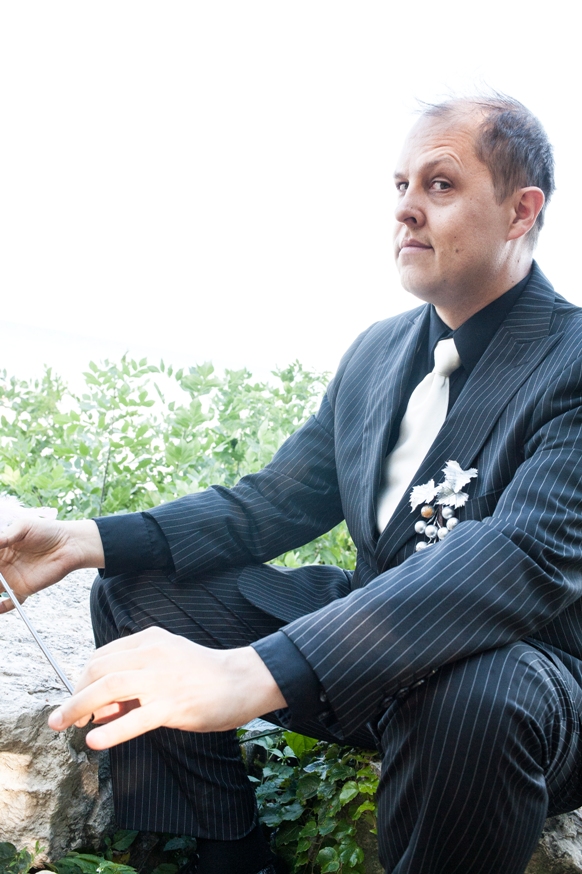
Chris Aruffo is a Chicago-based actor and philologist. His book, A Rational Guide to Verse: Scansion Made Simple (now in its second edition), discusses the use of natural rhythm in the production and interpretation of verse writing.
Q: What made you decide to give Unrehearsed a try?
CHRIS: Lately I’ve found it difficult to commit to any weeks-long “process” to develop a show into production. The minimal demands of not rehearsing are, right now, ideal for me.
Q: With the recent Unrehearsed workshop under your belt, how would say this technique differs from more conventional acting? Does it differ?
CHRIS: It differs by making a direct connection between the work and the result. Far too often I’ve seen “work” done at rehearsals from which an actor gains a greater and deeper understanding of the play, its history, its context, or the characters within it, but which in turn fails utterly to influence the actions and text presented by that actor in performance. In Unrehearsed, the work is designed to always have an evident effect either on specific lines that will be spoken or on particular actions that must be taken.
Q: As a philologist who has published a book specifically about verse interpretation (A Rational Guide to Verse: Scansion Made Simple, now in its second edition), how does this technique react to your knowledge of blank verse? Do they seem at odds with each other, or complimentary?
CHRIS: Unrehearsed technique promotes natural rhythms. Edgar Allan Poe described a poet as someone who arranges syllables into verse. That is to say– different syllables have different natural lengths (long and short, also referred to as stressed and unstressed), and arranging syllable lengths into specific patterns produces rhythm. A skilled poet is, therefore, a writer whose lines, when spoken naturally, will automatically produce their intended rhythms. As an obvious example, saying out loud Once upon a midnight dreary, while I pondered weak and weary immediately conjures the rhythmPoe wished to create. Shakespeare’s writing exploits natural rhythms in the same way, such that a naive reader will, if reading naturally, almost always unwittingly produce the rhythms of blank verse. Unrehearsed technique forces an actor to remain naive in speaking the text, because an actor ignorant of the “big picture” cannot confidently impose any interpretation other than the literal meaning of the words. Consequently, an Unrehearsed actor may be more likely to speak the words without unnatural emphases or pre-selected inflections– and, in doing so, will realize the natural rhythms of the text.
Q: What’s it like to prepare for a performance while knowing nothing about the show itself?
CHRIS: Very similar to preparing for a performance where I do know. In my own technique, I do my best not to anticipate or control what the other actors do, so I can respond to what they actually give me. Removing their lines from my script makes that pitfall easier to avoid.
Q: What (if anything) is your biggest challenge so far with this technique?
CHRIS: The scrolls– but perhaps not in the way one might expect. I read differently from most other people. When I look at a piece of text, I see whole paragraphs at once. Having such a large “chunk” in my head makes it easier to intuit, as I read along, how each word and every sentence fits into an overall message, which in turn provides guidance in real time for pace, emphasis, and phrasing. Only being able to see three or four lines on a scroll makes it more difficult to apprehend the overall flow of a speech. The narrow four-line window also makes it easier to lose my place, because I don’t have the full shape of the text.
Come check out some natural rhythm with Chris! Check out…
DOUBLE FEATURE
AUGUST 12
Comedy of Errors: 7:30pm
Justin’s
3358 N Southport Ave
AUGUST 16
Comedy of Errors: 7:00pm
Double Falsehood: 8:30pm
Mrs. Murphy & Sons Irish Bistro
3905 N Lincoln Ave
AUGUST 19
Double Falsehood: 7:30pm
Justin’s
3358 N Southport Ave
